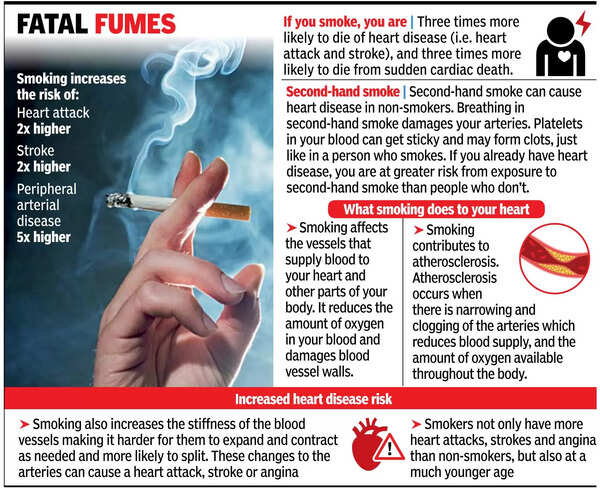The use of tobacco is a pioneer for heart diseases, causing a sudden death, says doctors. Bharat News

New Delhi: A 28 -year -old Air India Express pilot killed due to cardiac arrest, soon after her flying in Delhi on Wednesday, and the 23 -year -old woman dancing at a wedding in Madhya Pradesh in February, putting the headlines in the headlines on the increasing incidents of sudden heart deaths among young people. While dancing social media, suddenly falling and dying people are filled with videos, singing, singing, or simply walking, either due to cardiac arrest or heart attack – conditions are becoming more common in the under -40 age group.
Recently in Meimes, a senior cardiologist at the hospital, Dr. Ambuj Roy treated a 26 -year -old man when he suffered a heart attack on a large scale. He was physically fit and had no history of any chronic disease but the doctors found that he was a heavy smoking. “People combine tobacco-use, whether it is a smoking product or smoking, with lung diseases and cancer. But if you look at the data, the number of deaths caused by heart diseases, where tobacco is used is a criminal, is equal to the number of deaths caused by two diseases,” said Dr. Roy.

His colleague, Dr. Nitesh Naik called for raising awareness to reduce convertible risk factors, causing a serious heart situation, including a heart attack or a sudden heart arrest. These risk factors include smoking, high blood pressure, high blood cholesterol and obesity. “It is equally important for people aged 40 and above to undergo periodic health check -up for screening for underlying heart diseases,” he said. Timely detection and intervention can reduce the risk of serious complications, “he said.
In the case of the pilot, it is not yet clear that the arrest of the heart or sudden damage to heart activity has been triggered by irregular heart rhythm. But this incident has given rise to concerns about prolonged work and stress between pilots. Doctors say that several mechanisms have been posted to connect stress with heart diseases. This includes practical factors such as smoking, excess alcohol intake, lack of exercise, poor adherence to drugs and increased heart rate and increased blood pressure. These factors add doctors, either individually or in combination can increase the risk of heart disease in patients with high levels of stress.




